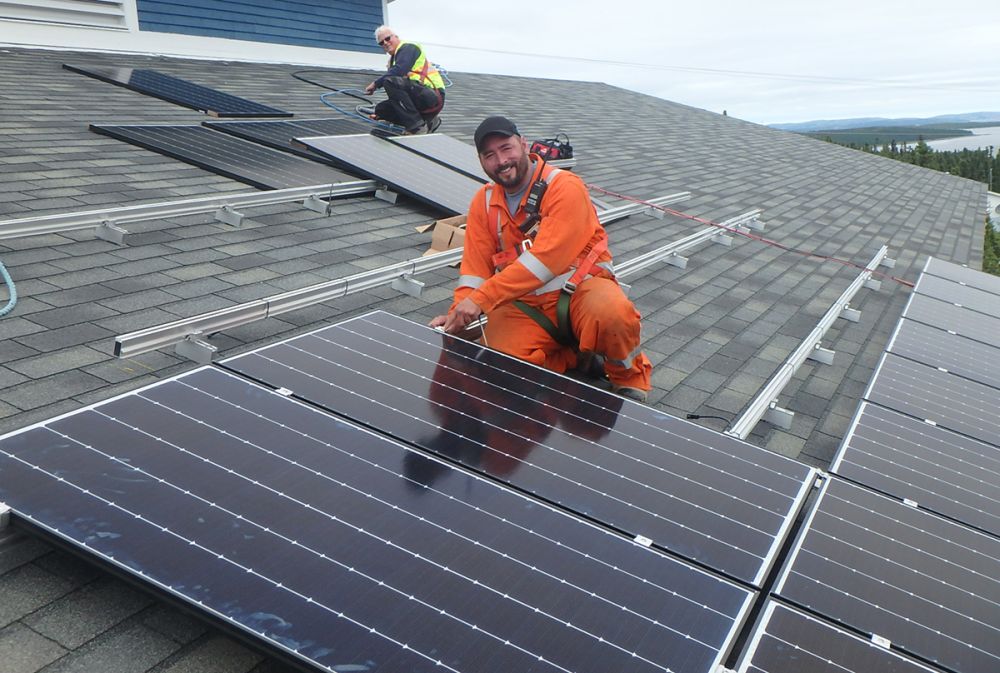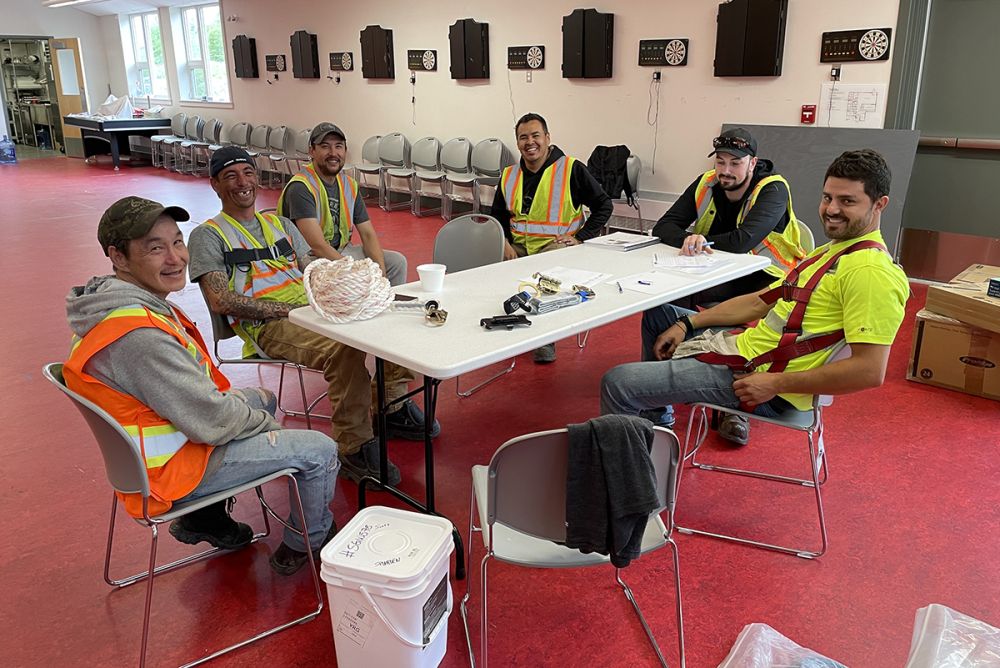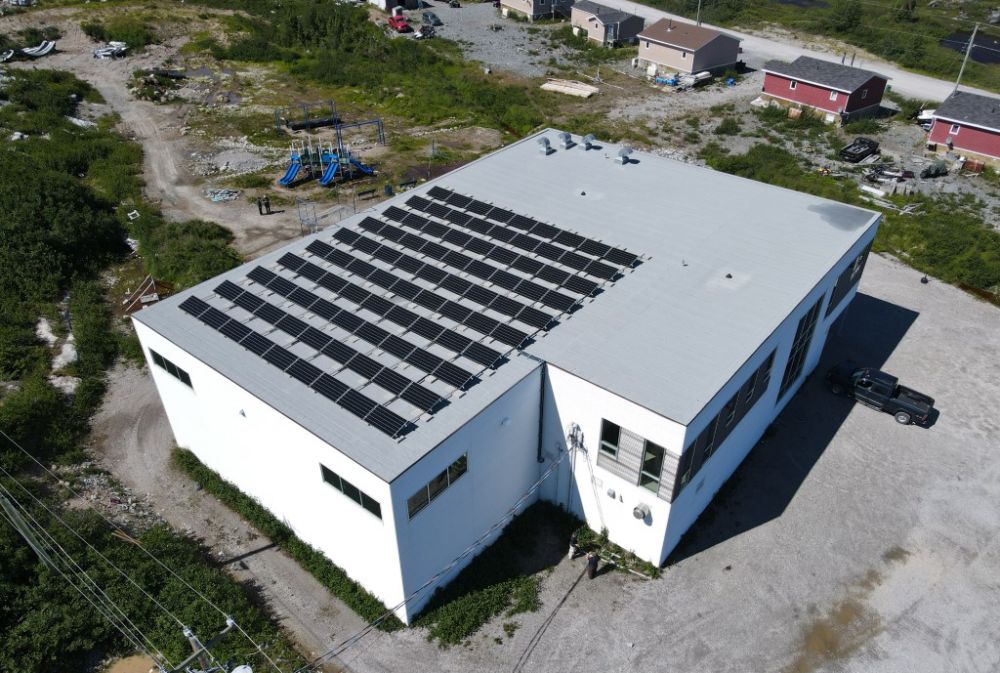
Solar panels over Jeremias Sillitt Community Centre, Nain, Newfoundland and Labrador. Photo: courtesy of Jamie Hewlett
From 2018 to 2023, the Pembina Institute was a proud co-delivery agent of the Indigenous Off-diesel Initiative (IODI), a federal program aimed at addressing capacity and funding deficits which limit communities’ ability to take on the important, but difficult, work of clean energy transformation in remote Indigenous communities. Through IODI, Indigenous leaders in remote communities across Canada have received funding and skills development support from a range of collaborators in government and the clean energy community.
The intiative demonstrates how governments can better support Indigenous leadership in the clean energy transition through creative and comprehensive program design. The Pembina Institute applauds Natural Resources Canada and the Indigenous Clean Energy (ICE) Social Enterprise in delivering the program’s second cohort which began in summer 2023. ICE’s programming has and continues to be a critical component of the capacity-building focus of the Indigenous Off-diesel Initiative.
Though our work with the program has ended, we’ve written this blog to amplify positive aspects and key recommendations stemming from our participation in IODI.
About the Indigenous Off-diesel Initiative
Natural Resource Canada’s Indigenous Off-diesel Initiative (IODI) is a“training program that supports Indigenous-led climate solutions in remote Indigenous communities that use diesel or fossil fuels for heat and power”. IODI is a positive example of effective and flexible government programming that is applying innovative approaches to funding allocation for remote Indigenous communities who are seeking to move off-diesel. The program had several critical components:
- a focus on Indigenous leadership and agency
- built-in capacity building
- one-on-one mentorship with both government and other clean energy professionals
- dedicated support for meeting reporting requirements
- flexible funding to support direct community needs
IODI’s structure ensures that the champions are equipped with the skills, expertise, and funding needed for community energy planning and project implementation.
Capacity building recommendations
Capacity building, skills development, and knowledge exchange are critical features of the IODI program. Future capacity building and funding programs can reflect the successes of the initiative by considering the following recommendations:
Funding, timelines, and program flexibility

Photo: courtesy of Jamie Hewlett
“When assisting Inuit governments or institutions in remote locations, it is important to understand the logistical challenges and short implementation window to complete projects. One delay can easily add another year to a project timeline. When creating programs, having budgets with flexible spending and timelines is very helpful.” - Jamie Hewlett, Regional Energy Coordinator for the Nunatsiavut Government and IODI champion
Communities undertaking energy transition face differing barriers determined by a wide range of factors including geography, community demographics, finances, and many other systemic, social, and environmental issues. Flexible spending and implementation timelines can support communities and clean energy leaders with the assurance that funding and other supports will not be threatened by unrealistic timelines and reporting requirements that do not accommodate unexpected community-based struggles.
As the clean energy transition in remote communities continues, governments should be sensitive to the unique challenges remote Indigenous communities face. Effective program design in this context requires program designers to reject traditional and often restrictive project implementation models and instead co-design programs which allow for flexibility in funding, timelines, and implementation.
Expansive partnership and collaboration

Photo: courtesy of Jamie Hewlett
“The key relationship here is project ownership and energy sovereignty. A project that is implemented on Inuit lands for the people in the region should not be considered without their involvement or partnership. With this ownership comes energy independence and having control over their energy supply.” - Jamie Hewlett, Regional Energy Coordinator for the Nunatsiavut Government and IODI champion
Developing community capacity to address an issue as entrenched as diesel dependency requires thorough community participation and engagement. This work cannot progress under an individualistic model; it must be carried out with collective participation. Future and/or improved capacity building programs should support those individuals and governments who work toward community-inclusive and culturally relevant approaches to clean energy planning and development.
Beyond community inclusion, the IODI also encouraged partnership and information exchange with experts within the clean energy sector. Through the initiative, champions were provided invaluable capacity building and mentorship from the ICE Social Enterprise, as well as policy-based research, information, and educational support from the Pembina Institute. Future programs should engage external experts and support partnerships which help alleviate information barriers for local leaders.
Indigenous rights

Photo: courtesy of Jamie Hewlett
“One of the most important lessons I am taking away from IODI is the importance of partnerships and teamwork, not just as a lone government but all of Inuit Nunangat. When we all share a common goal and help each other to achieve them, that is what drives change and makes a difference.” - Jamie Hewlett, Regional Energy Coordinator for the Nunatsiavut Government and IODI champion
The clean energy transition in remote communities is directly tied to Indigenous rights, energy sovereignty, and independence. To support this, capacity-building programs which service remote Indigenous communities should be designed to respect Indigenous rights to self-determination and social and economic development.
This means providing Indigenous energy champions with ownership and independence on the energy plans and projects implemented in their communities. This also means co-developing programs with Indigenous leaders to best reflect the needs of communities and being flexible in adjusting course as programs are delivered. For example, the Indigenous Off-diesel Initiative worked with community energy champions to ensure program priorities continued to reflect the needs of community through ensuring sufficient funding, tailored mentorship, and adjusting and minimizing report requirements.
Policy recommendations
As the Indigenous Off-diesel Initiative ends one chapter and continues to write another, the Pembina Institute applauds the first cohort for their leadership and accomplishments. Based in our work with these communities and clean energy leaders through IODI, we recommend that policy makers implement or engage with the following recommendations as the clean energy transition in remote communities continues:
- Direct funding to projects that practice early and respectful engagement with Indigenous communities and have a minimum 50 per cent Indigenous ownership
- Commit to including and prioritizing Indigenous perspectives and leadership in decision-making around clean energy project development in addition to regulatory reform to support the energy transition
- Adopt the United Nations Declaration on the Rights of Indigenous Peoples (UNDRIP) in provinces and territories that haven’t already, including embedding UNDRIP into clean energy policies
- Align utility and regulator mandates and actions with government climate and reconciliation policy objectives, ensure crown utilities implement both the TRC calls to action and UNDRIP
- Implement a federal production incentive top up to utility PPA rates
- Increase direct funding for housing, energy efficiency, and EV adoption to Indigenous peoples, businesses, and organizations, recognizing the higher financial barriers faced by residents in remote communities
Conclusion
The Indigenous Off-diesel Initiative is an innovative solution to the ongoing issue of both funding and capacity for the clean energy transition in remote Indigenous communities. As Indigenous communities and clean energy proponents work toward diesel displacement in regions across Canada, we encourage continued engagement with the initiative. Furthermore, we applaud the ongoing work of the ICE Social Enterprise, which will continue offering mentorship through the program.
For policymakers, communities, and corporations interested in supporting community visions of clean energy, we also encourage the design of programs which extend flexible and reliable support to clean energy proponents. This requires the creation of capacity building programs which are culturally informed and aligned with UNDRIP in addition to the ongoing reform of systematically entrenched policies which lock communities into diesel dependency.
The Pembina Institute was a co-delivery agent of the Indigenous Off-diesel Initiative from 2018-2023. As part of its participation, Pembina provided support to Indigenous clean energy leaders as well as analysis and research on a range of policy issues from housing and grid integration to PPA rates and UNDRIP. Our research and analysis is publicly available on pembina.org/rirc.
In the spirit of friendship and partnership, we thank Jamie Hewlett, Regional Energy Coordinator for the Nunatsiavut Governmentfor his perspectives and contributions to this publication.
Emily He is the manager of the Pembina Institute's renewables in remote communities program. She is based in Toronto.
Bhan Gatkuoth is a senior communications lead for the Pembina Institute's Renewables in Remote Communities program.




